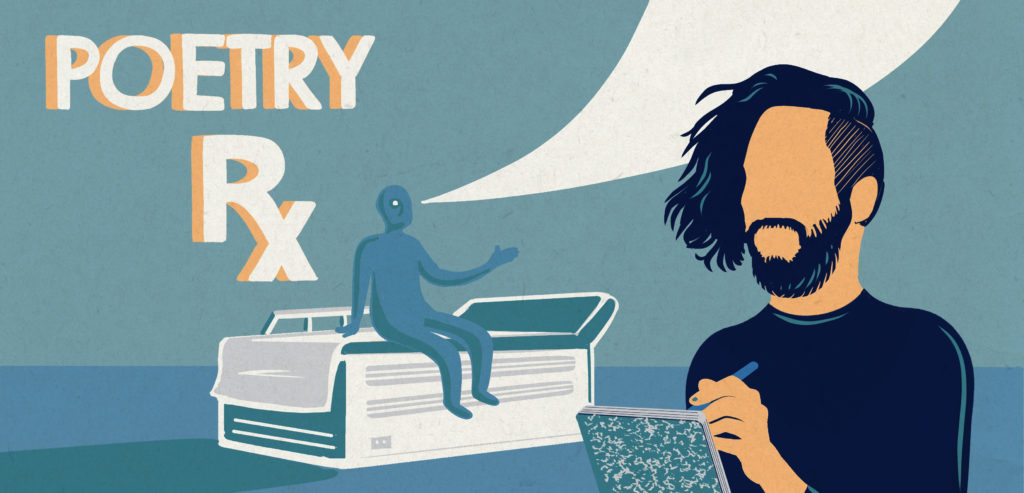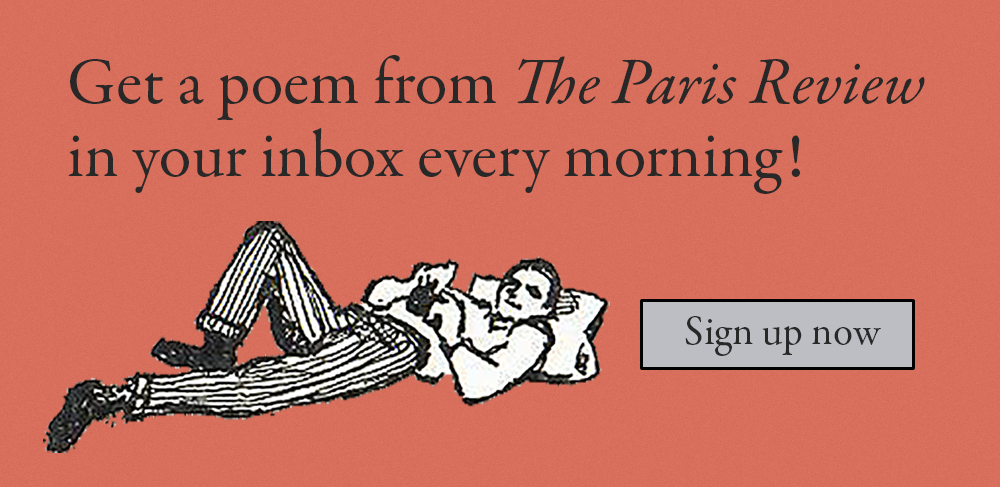In our column Poetry Rx, readers write in with a specific emotion, and our resident poets—Sarah Kay, Kaveh Akbar, and Claire Schwartz—take turns prescribing the perfect poems to match. This week, Kaveh Akbar is on the line.
Dear Poets,
I’m a young artist and writer—twenty-two, just graduated, and starting out on a professional career. I’m having some success: a few group shows, a couple publications, and a few readings in small spaces. For this, I am incredibly grateful. I try to celebrate these accomplishments and not continue to fall into the trap of berating myself for “not doing enough.” That being said, last night, a close friend and I read at an event to which four people showed up, the host of the series included. I got a lot of apology texts, and I understand. I, too, have had hard days and not been able to show up for other people. But the number of these excuses, and the silence, from a great number of other close friends has been a little disappointing.
I’ve got a few solid friends that are forever supportive, but they’re spread across continents now. I am grateful for all of these people, too, but how do I celebrate my accomplishments when the people around me don’t seem interested in celebrating with me?
Sincerely,
Forced to Toot My Own Horn
Dear Tooting,
I’m cringing reading your note—I have given so many readings to empty rooms, to rooms where everyone was watching a TV or talking over me, rooms where audiences were absent or ambivalent or, worst of all, openly hostile to my presence. It’s part of the deal for most of us, and I promise you, as much as it stings in the moment, it will become your superpower. You will never be a writer who takes their audience for granted, one who gets onstage and half-heartedly drones through twenty minutes of material while your audience furtively checks their phones. Surely you’ve been to such readings—readings where an author carries themselves as if they’re doing the room a favor by the sheer fact of being present. What a blessing that this will never be you!
Today, I offer you W. S. Merwin’s poem for his teacher John Berryman:
I had hardly begun to read
I asked how can you ever be sure
that what you write is really
any good at all and he said you can’tyou can’t you can never be sure
you die without knowing
whether anything you wrote was any good
if you have to be sure don’t write
It’s a stirring remembrance and a perfect reminder that the external factors—publications, prizes, praise from friends—are unsustainable and out of your hands. All you control is what you make. That’s a clean-burning fuel. The more you can orient the joy of your creative process in making and having made, the more sustainable your practice becomes. All the praise, the readings, the audiences will become bonus occasions for gratitude, built on top of the bedrock gratitude for writing itself.
—KA
*
Dear Poets,
For the past few years, I’ve had an intense emotional and physical attraction to someone who is not my partner. Recently, I brought this up with my crush—it turned out he felt the same way—and we agreed that the best thing to do was to stay friends because he has moved away and I am with someone. We spent too long dancing around each other, and now it’s too late. I thought having that conversation would bring closure, but at least for me, it’s been painful. Please send any poems to help me come to terms with being here, in a place I love but where memories of him are everywhere, poems to help me feel at peace with knowing we missed a chance, perhaps, of something.
Sincerely,
Bad Timing
Dear Bad Timing,
I give you Peter Twal’s “The Moral Kicks In.” Twal writes:
Patron saint of stifling
anger on the rocks Patron saint of politely melting into this tomato soup a spoonful at a time
& we speak in fortune cookie all night The next dish, a ventilator An IV dripping into something
already dead
It sounds to me like your current relationship with your partner may also be “an IV dripping into something / already dead.” If you’ve been harboring feelings for another, if you’ve confirmed those feelings are reciprocated, if you’ve spoken with your crush but not your partner about the situation, it sounds to me like you are, at least unconsciously, checked out of your current relationship. It’s not fair to your partner to keep up the facade, nor is it fair to you to neglect what has clearly become an overwhelming infatuation.
—KA
*
Dear Poets,
My father was diagnosed with cancer a year and a half ago. His treatment was successful, and he recovered after surgery and cycles of chemotherapy. But shortly after the treatment, he went back to consuming tobacco, a root cause of the cancer he recovered from. He is incorrigible and far from being cognizant of how dangerous this can be. We come from a place where community rehabilitation doesn’t exist. My mother and my family are stifled and helpless. We love him, but his adamance and negligence are breaking us down. Do you know of any poems that could help keep me going through this distress—words that remind me to be headstrong and find a way out?
Thanks,
Headstrong for Papa
Dear Headstrong for Papa,
I’m happy to hear that your father’s treatment was successful—I can’t imagine that experience was easy for any of you. For you, I offer Melissa Stein’s “Anthem”:
We were all in love
continually. Bless
our little hearts,
smoking and drinking
and wrecking things.
I think about that line often, the little heart “smoking and drinking and wrecking things.” That’s a beautiful phrase for the terrible truth of addiction—there’s nothing you can say, no matter how emotional or rational or true, that will cure your father’s addiction for him, and there’s also nothing you can say, no matter how frustrated or tired or thoughtless, that’ll make it any worse. Addiction is its own disease, a storm contained entirely within the bottle of your father’s mind.
The only way your father can address his addiction is to decide for himself that it’s time. You say there are no community rehabilitation resources near you, but you might be able to point him toward smokefree.gov, which offers resources to build an individualized tobacco cessation plan, or an app like MyQuit Coach, which offers personalized plans and also badges and achievements. At the end of it all, though, will be your father, left to make his own decisions. You can be present for him, a resource and encourager—but for your own health, you need to disabuse yourself of the notion that you can singlehandedly save his.
—KA
Want more? Read earlier installments of Poetry Rx. Need a poem? Write to us! In the next installment, Sarah Kay will be answering questions.
Kaveh Akbar’s poems have appeared recently in The New Yorker, Poetry, the New York Times, the Nation, and elsewhere. His first book is Calling a Wolf a Wolf. Born in Tehran, Iran, he teaches at Purdue University and in the low-residency M.F.A. programs at Randolph College and Warren Wilson College.
from The Paris Review http://bit.ly/2IY6FJ9


Comments
Post a Comment